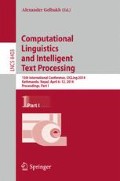Abstract
In this paper, we show some properties of function words in dependency trees. Function words are grammatical words, such as articles, prepositions, pronouns, conjunctions, or auxiliary verbs. These words are often short and very frequent in texts and therefore many of them can be easily recognized. We formulate a hypothesis that function words tend to have a fixed number of dependents and we prove this hypothesis on treebanks. Using this hypothesis, we are able to improve unsupervised dependency parsing and outperform previously published state-of-the-art results for many languages.
Access this chapter
Tax calculation will be finalised at checkout
Purchases are for personal use only
Preview
Unable to display preview. Download preview PDF.
References
Tesnière, L.: Eléments de syntaxe structurale. Editions Klincksieck, Paris (1959)
Sgall, P., Hajičová, E., Panevová, J.: The Meaning of the Sentence in Its Semantic and Pragmatic Aspects. Reidel, Dordrecht (1986)
Menezes, A., Richardson, S.D.: A best-first alignment algorithm for automatic extraction of transfer mappings from bilingual corpora. In: Proceedings of the Workshop on Data-driven Methods in Machine Translation, vol. 14, pp. 1–8 (2001)
Banarescu, L., Bonial, C., Cai, S., Georgescu, M., Griffitt, K., Hermjakob, U., Knight, K., Koehn, P., Palmer, M., Schneider, N.: Abstract meaning representation for sembanking. In: Proceedings of the 7th Linguistic Annotation Workshop and Interoperability with Discourse, pp. 178–186. Association for Computational Linguistics, Sofia (August 2013)
Zipf, G.K.: The Psychobiology of Language. Houghton Mifflin, Boston (1935)
Zeman, D., Mareček, D., Popel, M., Ramasamy, L., Štěpánek, J., Žabokrtský, Z., Hajič, J.: HamleDT: To Parse or Not to Parse? In: Proceedings of the Eight International Conference on Language Resources and Evaluation (LREC 2012). European Language Resources Association (ELRA), Istanbul (2012)
Buchholz, S., Marsi, E.: CoNLL-X shared task on multilingual dependency parsing. In: Proceedings of the Tenth Conference on Computational Natural Language Learning, CoNLL-X 2006, pp. 149–164. Association for Computational Linguistics, Stroudsburg (2006)
Nivre, J., Hall, J., Kübler, S., McDonald, R., Nilsson, J., Riedel, S., Yuret, D.: The CoNLL 2007 Shared Task on Dependency Parsing. In: Proceedings of the CoNLL Shared Task Session of EMNLP-CoNLL 2007, pp. 915–932. Association for Computational Linguistics, Prague (June 2007)
Mareček, D., Straka, M.: Stop-probability estimates computed on a large corpus improve Unsupervised Dependency Parsing. In: Proceedings of the 51st Annual Meeting of the Association for Computational Linguistics, vol. 1: Long Papers, pp. 281–290. Association for Computational Linguistics, Sofia (August 2013)
Klein, D., Manning, C.D.: Corpus-based induction of syntactic structure: models of dependency and constituency. In: Proceedings of the 42nd Annual Meeting on Association for Computational Linguistics, ACL 2004. Association for Computational Linguistics, Stroudsburg (2004)
Headden III, W.P., Johnson, M., McClosky, D.: Improving unsupervised dependency parsing with richer contexts and smoothing. In: Proceedings of Human Language Technologies: The 2009 Annual Conference of the North American Chapter of the Association for Computational Linguistics, NAACL 2009, pp. 101–109. Association for Computational Linguistics, Stroudsburg (2009)
Spitkovsky, V.I., Alshawi, H., Jurafsky, D.: Punctuation: Making a point in unsupervised dependency parsing. In: Proceedings of the Fifteenth Conference on Computational Natural Language Learning, CoNLL 2011 (2011)
Spitkovsky, V.I., Alshawi, H., Jurafsky, D.: Three Dependency-and-Boundary Models for Grammar Induction. In: Proceedings of the 2012 Conference on Empirical Methods in Natural Language Processing and Computational Natural Language Learning, EMNLP CoNLL 2012 (2012)
Gilks, W.R., Richardson, S., Spiegelhalter, D.J.: Markov chain Monte Carlo in practice. Interdisciplinary statistics. Chapman & Hall (1996)
Mareček, D., Žabokrtský, Z.: Gibbs Sampling with Treeness constraint in Unsupervised Dependency Parsing. In: Proceedings of RANLP Workshop on Robust Unsupervised and Semisupervised Methods in Natural Language Processing, Hissar, Bulgaria, pp. 1–8 (2011)
Mareček, D., Žabokrtský, Z.: Exploiting reducibility in unsupervised dependency parsing. In: Proceedings of the 2012 Joint Conference on Empirical Methods in Natural Language Processing and Computational Natural Language Learning, EMNLP-CoNLL 2012, pp. 297–307. Association for Computational Linguistics, Stroudsburg (2012)
Majliš, M., Žabokrtský, Z.: Language richness of the web. In: Proceedings of the Eight International Conference on Language Resources and Evaluation (LREC 2012). European Language Resources Association (ELRA), Istanbul (May 2012)
Brants, T.: TnT - A Statistical Part-of-Speech Tagger. In: Proceedings of the Sixth Conference on Applied Natural Language Processing, pp. 224–231 (2000)
Spitkovsky, V.I., Alshawi, H., Jurafsky, D.: Breaking out of local optima with count transforms and model recombination: A study in grammar induction. In: Proceedings of the 2013 Conference on Empirical Methods in Natural Language Processing, pp. 1983–1995. Association for Computational Linguistics, Seattle (October 1995)
Abney, S.P.: The English Noun Phrase In Its Sentential Aspect. PhD thesis. MIT (1987)
Author information
Authors and Affiliations
Editor information
Editors and Affiliations
Rights and permissions
Copyright information
© 2014 Springer-Verlag Berlin Heidelberg
About this paper
Cite this paper
Mareček, D., Žabokrtský, Z. (2014). Dealing with Function Words in Unsupervised Dependency Parsing. In: Gelbukh, A. (eds) Computational Linguistics and Intelligent Text Processing. CICLing 2014. Lecture Notes in Computer Science, vol 8403. Springer, Berlin, Heidelberg. https://doi.org/10.1007/978-3-642-54906-9_20
Download citation
DOI: https://doi.org/10.1007/978-3-642-54906-9_20
Publisher Name: Springer, Berlin, Heidelberg
Print ISBN: 978-3-642-54905-2
Online ISBN: 978-3-642-54906-9
eBook Packages: Computer ScienceComputer Science (R0)

